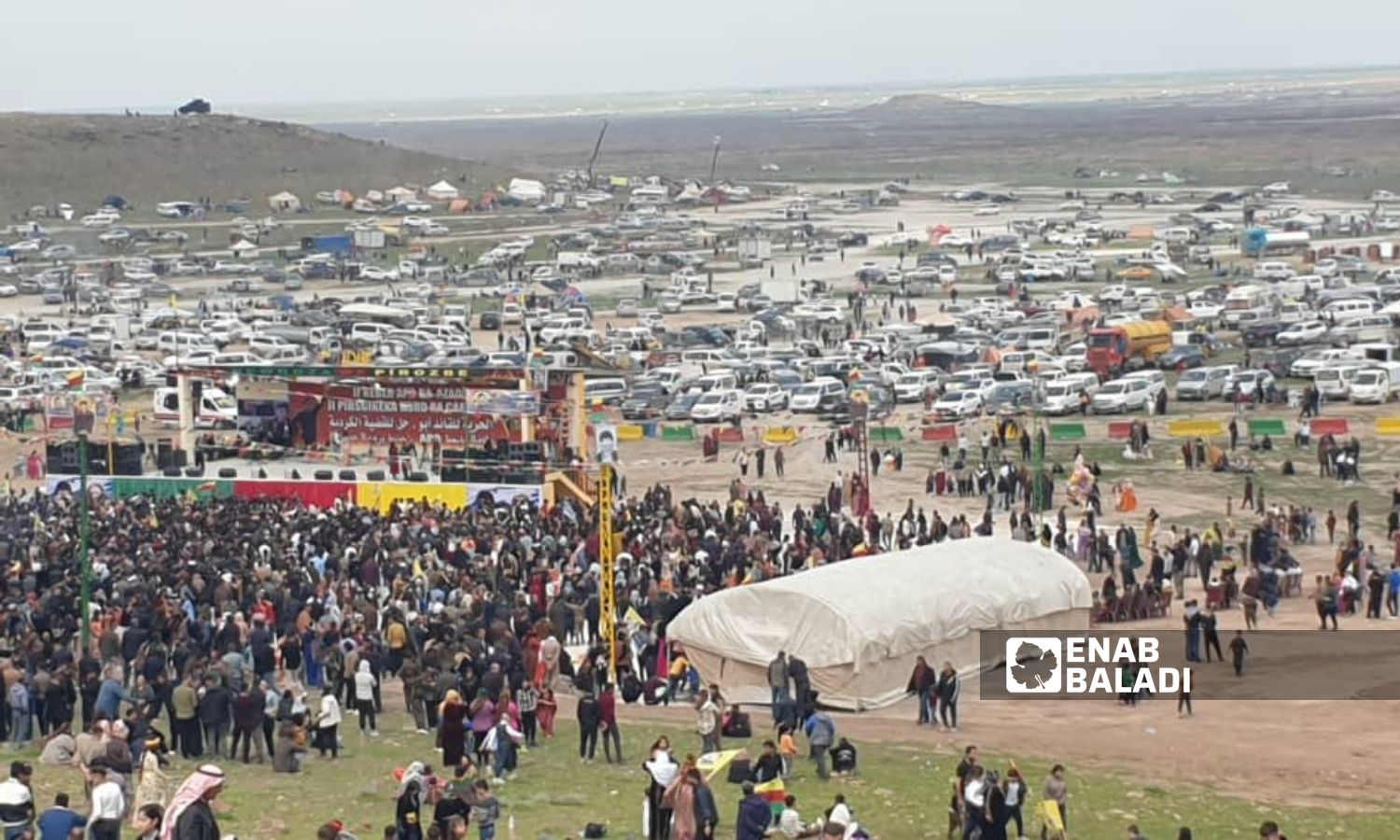



On March 21, at the beginning of every year, millions of Kurds, Persians, Pashtuns, Azerbaijanis, and other peoples celebrate Nowruz, which means “new day” in both Persian and Kurdish.
Nowruz is considered the New Year’s Day for these people and it is one of the ancient festivals celebrated by various cultures.
In Syria, many cultures celebrate Nowruz with special rituals, most notably the Kurdish component, whose members are spread across various provinces and regions of Syria. However, areas under the control of the Autonomous Administration of North and East Syria (AANES) are the most prominent in terms of the scale of these celebrations.
In areas under the control of the Syrian Interim Government (SIG) in the north of Aleppo province, Kurds from Afrin, Jindires, and other regions celebrate the same festival, as shown by numerous photos and video recordings coming from the region.
Living in the city of Qamishli in the north of al-Hasakah province, 28-year-old Kurdish young woman Hevda Khayri, like the rest of the residents, is keen on the preparation rituals and celebrations of Nowruz. She told Enab Baladi that the rituals on the night that links the 20th and 21st of March involve lighting fires as a symbol of freedom and victory, drawn from the story of Kawa the blacksmith who triumphed over King Zahhak and lit a great fire as a sign of victory.
She added that wearing traditional Kurdish attire is one of the most important rituals during the Nowruz celebrations for the Kurdish people. These outfits are divided between men and women; men wear green clothes, while women wear colorful gowns inspired by nature’s and its flowers’ colors.
The celebrations begin by going out to nature and having barbecue parties and lighting fires before the sunrise of the new year, in line with the tradition of Kawa the blacksmith. These celebrations are accompanied by old Kurdish songs and dances. In the present day, artistic parties are held where artists and singers participate in a traditional dance known as “Jobie.”
In the city of Qamishli as well, Kurdish young woman Vivan Fawzi resides and she too enthusiastically participates in the Nowruz celebrations with her girlfriends in the village of Himo in the countryside of the city, where they wear the Kurdish dress with its vibrant colors.
Vivan told Enab Baladi that she woke up early as usual with her family members, then went early to prepare food, hookah, coffee, tea, and nuts.
She added that she and her companions go out to celebrate regardless of the weather on this day of the year, organizing folk dances and celebratory events.
52-year-old Sayyid Khalil, a teacher in one of the schools in Qamishli city, told Enab Baladi that according to the local narrative, there was an oppressive king reigning over Kurdistan named “Zahhak” who had snakes living on his shoulder, and one of his advisers suggested that the snakes be fed the brains of Kurdish youths daily to stay strong and healthy.
To confront this oppression, Kawa the blacksmith led a revolt against the king, which began by lighting fires on the mountains on the night of the 20th of March. The Kurds, led by Kawa, attacked the palace, and killed the tyrant king the following morning, declaring deliverance.
Based on this folk story, Kawa the blacksmith is considered the liberator of the Kurdish people.
The Kurdish calendar dates back to 2800 years, which is 612 BC, according to Khalil.
The word “Nowruz” is divided into two parts in the Kurdish language; “now” means new and “ruz” means day, symbolizing the beginning of an era free from oppression and murder.
Khalil also added during his talk with Enab Baladi that celebrations were forbidden more than 15 years ago, as the regime would deploy security patrols before the celebrations every year, roaming the streets, preventing the celebration of the Nowruz festival, and arresting violators.
He added that the Kurds from al-Hasakah used to celebrate by visiting their relatives, and some would light fires inside their homes, and the women would prepare dishes of meat and wheat grains for the festival. But now, the Kurds go out to nature to celebrate, they set up tents, light fires freely, grill meats, and buy sweets from the market.
With the facilitated measures that followed the northern and eastern parts of Syria being out of the control of the Syrian regime forces, celebrating Nowruz became an annual tradition in Syria, especially in those areas controlled by the Autonomous Administration formed mainly of Kurdish parties.
Every year, the Autonomous Administration bans the movement of motorcycles and cargo vehicles of all sizes in conjunction with the Nowruz celebrations in its controlled areas.
The Autonomous Administration said in a circular issued on Tuesday, March 19, that it imposed a set of measures and requested adherence to them during the Nowruz celebrations, including banning the motion of medium and large-sized trucks and tankers until the end of the current week.
According to the circular issued by the Autonomous Administration’s Internal Security Forces (Asayish), the movement of motorcycles of all types, even military, is prohibited until April 6.
In its fourth clause, the circular prohibits the discharge of firearms by civilians and military personnel, and security forces under legal accountability and confiscation of the weapon even if it was licensed.
if you think the article contain wrong information or you have additional details Send Correction